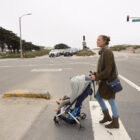See our November 2022 SF Election Guide for a nonpartisan analysis of measures and contests on the ballot in San Francisco for the election occurring Nov. 8, 2022. Voters will consider the following proposition in that election.
Proposition I would overturn an ordinance that has closed John F. Kennedy Drive in Golden Gate Park to most private motor vehicles seven days a week and closed the Great Highway along Ocean Beach to such traffic on weekends and holidays. The city would be forbidden from proceeding with plans to eventually close the Great Highway between Sloat and Skyline boulevards — a stretch that is subject to coastal erosion. This measure requires more than 50% affirmative votes to pass.
This ballot measure would amend the park code to override a Board of Supervisors decision from May 2022 that turned JFK Drive in Golden Gate Park into the JFK Promenade and closed the Great Highway on weekends.
JFK Drive between Kezar Drive and the Great Highway was closed to motor vehicles seven days a week in April 2020. The then-temporary plan was to create “social distancing” space for people to walk, run, jog or bicycle during the COVID-19 pandemic. A similar section of the Great Highway at Ocean Beach was closed for the same purposes on weekends and holidays.
Under Proposition I, JFK Drive would be completely open on weekdays, but still closed to private cars on weekends from 6 a.m. to 6 p.m. between April and September and on holidays. The Great Highway would be open to vehicle traffic seven days a week, except for special city approved events.
Proposition I would also forbid the city from moving forward with a plan to eventually close the Great Highway between Sloat Boulevard and Skyline Boulevard to private vehicles. Under the current plan, traffic would be diverted to the other side of the San Francisco Zoo along Skyline and Sloat boulevards. The change is part of a larger effort called the Ocean Beach Climate Adaptation Project. Work could begin as soon as late 2023 and last four years.
The Great Highway is subject to erosion due to sea level rise, and city planners believe it is only a matter of time before it will be impossible to maintain the entire roadway for use by motor vehicles. Instead, the area would be turned into a series of nature paths and a parking lot.
The idea is similar to what was done with a dangerous and erosion-prone section of Highway 1 in San Mateo County called the Devil’s Side, which was closed upon completion of the Tom Lantos Tunnel, which routes traffic through San Bruno Mountain. The Devil’s Slide section remains open to pedestrians and bicycles, but no major repair work is done on the roadbed, which is eventually expected to fall into the ocean.
The San Francisco Controller’s Office estimates that maintaining the entire Great Highway would cost at least $80 million over the next 20 years.
Proposition I would also take JFK Drive and the Great Highway out of the jurisdiction of the Recreation and Parks Department and place the roadways under the purview of the Department of Public Works, which manages most of the city’s roadways.
Supporters of Proposition I, including disability rights advocate Howard Chabner, argued that closing JFK Drive and the Great Highway “hurts people with disabilities, seniors and families” by limiting their access to areas in the park. Supporters also contend that Proposition I will “move cars back to major roadways and off local streets that aren’t designed for high volume traffic.”
In a paid ballot argument, the group Seniors for Inclusion said that nearly 1,000 free parking spaces and a dozen ADA parking spaces near major attractions such as the Conservatory of Flowers, DeYoung Museum and California Academy of Sciences can no longer be accessed.
Opponents of Proposition I include Supervisors Matt Dorsey, Gordon Mar, Merna Melgar, Dean Preson and Hilary Ronen. Supervisor Ronen said the decision to close JFK Drive was “a consensus introduced by Mayor London Breed and passed by seven board members.” She believes it provides “a protected, safe open space for recreational use.” Ronen is especially critical of the section of Proposition I that would disrupt the Ocean Beach Climate Adaptation Project, which includes the eventual closure of part of the Great Highway, but she said it would also force a halt to plans to “protect the Westside’s Sewage Treatment facilities that are at risk of falling into the sea.”
Proposition I prompted some members of the Board of Supervisors to put Proposition J on the ballot, which would make the changes a permanent part of the park code.
If Proposition I passes, the board may later amend the ordinance by a two-thirds vote, but only if the amendments are either consistent with the measure’s purposes or required by a court. If Proposition I passes with more votes than Proposition J, then Proposition J would have no legal effect.









